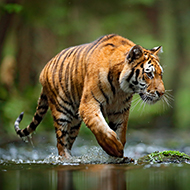Vaccinating tigers against canine distemper could cut extinction risk - study

The study found that vaccinating just two tigers within a small population could reduce extinction risk by 75 per cent.
Vaccinating Amur tigers against canine distemper virus (CDV) could significantly reduce the species' risk of extinction, according to new research.
The study by Cornell University, University of Glasgow and the Wildlife and Conservation Society found that vaccinating just two tigers within a small population each year could reduce the Amur tiger's risk of extinction by CDV by almost 75 per cent.
Previously, it had been assumed that the primary cause of CDV infection in wild tigers was a result of the animals coming into contact with dogs. However, new research, published in Proceedings of the National Academy of Sciences, reveals that other local wildlife are the primary source of infection.
Sarah Cleaveland, a professor of comparative epidemiology at the University of Glasgow, said: “This work shows that CDV in the Amur tiger is a solvable problem - a rare piece of good news for the tiger conservation community.”
In the study, researchers used samples from domestic dogs, tigers and other wild carnivores - sourced from their natural habitat of the Russian Taiga Forest - to compare viral genetic sequence data. They also used antibodies to assess patterns of exposure in each population.
Their findings reveal that canine distemper is more abundant small-bodied species such as martens, badgers and raccoon dogs. As study co-author Dr Nadezhda Sulikhan explains, other wildlife are, therefore 'the most important contributors to the CDV reservoir.'
Owing to the lack of CDV oral vaccinations, researchers say the only possible way to control CDV in wild carnivore populations is through using an injectable vaccine on the tigers themselves. Using serum from tigers vaccinated in captivity, the team were able to show that currently-available CDV vaccines could neutralise the strain of CDV they had detected in Russia.
The scientists developed a computer model to demonstrate that vaccinating as few as two tigers a year could significantly reduce the tigers' risk of extinction. This would cost just $30,000 US dollars annually, or less if vaccines are administered when tigers are captured for routine radio-collaring studies.
Dr Martin Gilbert, from the Cornell Wildlife Health Center, said: “Understanding how tigers are catching distemper is absolutely crucial to helping us design effective measures to minimize the conservation impact of the virus.
“Vaccinating tigers is hard to do, but our research shows that immunizing just two tigers within a small population each year can reduce the risk that CDV will cause extinction by almost seventy-five per cent. At least in the Russian Far East, vaccinating local domestic dogs would not be an effective strategy to protect tigers.”



 The latest
The latest